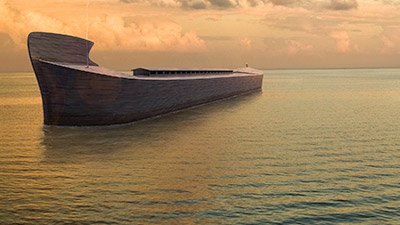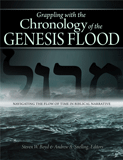
The Flood Accounts
It is important to compare the differences in these two flood accounts in order to examine their relationship.
Survey of the Gilgamesh Epic tablet XI
On his journey in quest of immortality,1 Gilgamesh met Utnapishtim. When Gilgamesh asked him how he got (eternal) life,2 Utnapishtim told him about the flood. When Utnapishtim lived in Shuruppak, the great gods decided to send a flood on the earth to wipe out all humans. The god Ea secretly revealed the gods’ plan to Utnapishtim. According to Ea’s commandment, he transformed his reed hut into a ship and made all of his kin and relatives, craftsmen, and animals embark on it to escape from the flood. The great rainstorm continued for six days. When the seventh day arrived, the storm and the flood subsided. All humans outside the ship were turned into clay by the flood and the ship eventually landed on Mt. Nisir. After seven days, Utnapishtim sent out a dove to see if the water had receded, but it returned after finding no place to roost. Next, a swallow also returned. Finally, a raven did not return. Utnapishtim offered a sacrifice to the gods. Enlil got angry when he found the survivors. However, appeased by Ea’s intervention,3 Enlil permitted Utnapishtim and his wife to become like gods and he transferred them from the land to “the mouth of the rivers.”
Then, Utnapishtim said to Gilgamesh “Now who will assemble the gods for you so that you may find the eternal life that you seek?” Afterward, Utnapishtim challenged Gilgamesh to stay awake for a week in return for immortality; however, Gilgamesh failed.4 Having accepted his mortality,5 Gilgamesh decided to return to his country. As he leaves, Utnapishtim told him about “the plant of rejuvenation” which rejuvenates an old man to a young man. Even though Gilgamesh got it, on his way home a serpent ate it. Finally, Gilgamesh returned to Uruk and he was content with his achievement, the great city wall.6
Survey of the Genesis Flood account
God decided to destroy all flesh on the earth by the Flood because of their corruption.
God decided to destroy all flesh on the earth by the Flood because of their corruption. However, Noah was a righteous man and he walked with God in his generation. God instructed Noah to build the Ark and embark on it with his wife, his three sons, and the wives of his three sons. God also commanded Noah to load seven pairs7 of each kind of clean animal, male and female, and one pair of every kind of unclean animal, a male and a female, and food for them. God announced to Noah that He would send the Flood after seven days. After Noah did all that God had commanded him and entered the Ark, God shut him in.
In the six hundredth year of Noah’s life, on the seventeenth of the second month, the Flood waters came on the earth. It rained for forty days and forty nights and the waters prevailed on the earth for one hundred and fifty days. The waters rose and covered the high mountains to the depth of more than twenty feet and God destroyed all men, animals, and birds on the earth except the occupants of the Ark.
At the end of the hundred and fifty days, the waters decreased and the Ark rested on the mountains of Ararat. After forty more days, Noah opened the window of the Ark and sent out a raven to see if the waters had abated from the earth. It flew here and there until the water dried up from the earth. Seven days later,8 Noah also sent out the dove. She found no place to perch and returned to him. Noah waited seven more days and sent out the dove. She returned with a freshly plucked olive leaf in her beak. Then, Noah knew that the waters had abated from the earth. He waited seven more days and sent out the dove again. She did not return. By the twenty-seventh day of the second month of Noah’s six hundred and first year, the earth was dry.
God told Noah to go out from the Ark. After Noah went out from the Ark with his family and all the animals he had loaded, he built an altar and offered burnt offerings. God blessed Noah and his sons and promised that He would never destroy the earth again by a flood and set the rainbow as the sign of the covenant.
After the Flood, from Noah’s three sons, Shem, Ham, and Japheth, the whole earth was repopulated.
The common elements and differences
As noted above, the flood accounts in the Gilgamesh Epic and Genesis have many common elements. Merrill F. Unger proposes that both accounts share the following characteristics:
(1) state that the deluge was divinely planned, (2) agree that the impending catastrophe was divinely revealed to the hero of the deluge, (3) connect the deluge with defection in the human race, (4) tell of the deliverance of the hero and his family, (5) assert that the hero of the deluge was divinely instructed to build a huge boat to preserve life, (6) indicate the physical causes of the flood, (7) specify the duration of the flood, (8) name the landing place of the boat, (9) tell of the sending forth of birds at certain intervals to ascertain the decrease of the waters, (10) describe acts of worship by the hero after his deliverance, and (11) allude to the bestowment of special blessings upon the hero after the disaster.9
However, as K.A. Kitchen mentions, “A series of basic general similarities suggests a definite relationship between the two traditions; but there are also many detailed differences.”10 The differences between the Epic and the Genesis account are the clarity of the reason for the flood, the character of god and of the hero, the specifics of the number and gender of the survivors and animals, the structure of the ship, the duration and the source of the flood, the kind and number of the birds for the test flights, the landing place of the ship, and the references to the repopulation after the flood. It is important to compare these differences in order to examine the relationship of the two accounts.
Footnotes
- “The central theme of the Gilgamesh Epic is humanity’s struggle to come to terms with its mortality” and tablet XI “comprises only one episode within a large narrative.” Brian B. Schmidt, Flood Narratives of Ancient Western Asia, CANE, vol. III & IV, p. 2340.
- In the text, “balatu” is used. Foster and Heidel translate “eternal life.” Foster, p. 84. Heidel, p. 80. Cf. Jeremy Black, Andrew George, and Nicholas Postgate (Ed.), A Concise Dictionary of Akkadian, Harrassowiz Verlag, Wiesbaden, 2000.
- Heidel, pp. 226–227.
- In the text, the reason for this test is not explained. “The meaning of this line appears to be that if he can master sleep, the twin brother of death, he may then be able to master also death itself.” A. Ungnad and H. Gressman, Das Gilgamesch-Epos, Göttingen, p. 140, 1911; R.W. Rogers, Cuneiform Parallels to the Old Testament, New York and Cincinnati, p. 101, 1926; in Heidel, p. 9.
- Moran, p. 2335.
- Heidel, p. 10.
- Cf. chapter four.
- Cf. The phrase “
another seven days
” (Gen. 8:10) seems to imply that the interval between the raven and the first dove was also seven days. John C. Whitcomb and Henry M. Morris, The Genesis Flood: The Biblical Record and Its Scientific Implications, with a foreword by John C. McCambell, Presbyterian and Reformed Publishing Company, Phillipsburg, p. 3, 1961. - Merrill F. Unger, Archaeology and the Old Testament, 3rd ed., Zondervan Publishing House, Grand Rapids, pp. 55–65, 1956; in Whitcomb and Morris, p. 38.
- K.A. Kitchen, Ancient Orient and Old Testament, Inter-Varsity Press, 1966; reprint, Wipf and Stock Publishers, Eugene, p. 90, 2001.
Recommended Resources

Answers in Genesis is an apologetics ministry, dedicated to helping Christians defend their faith and proclaim the good news of Jesus Christ.
- Customer Service 800.778.3390
- Available Monday–Friday | 9 AM–5 PM ET
- © 2026 Answers in Genesis




